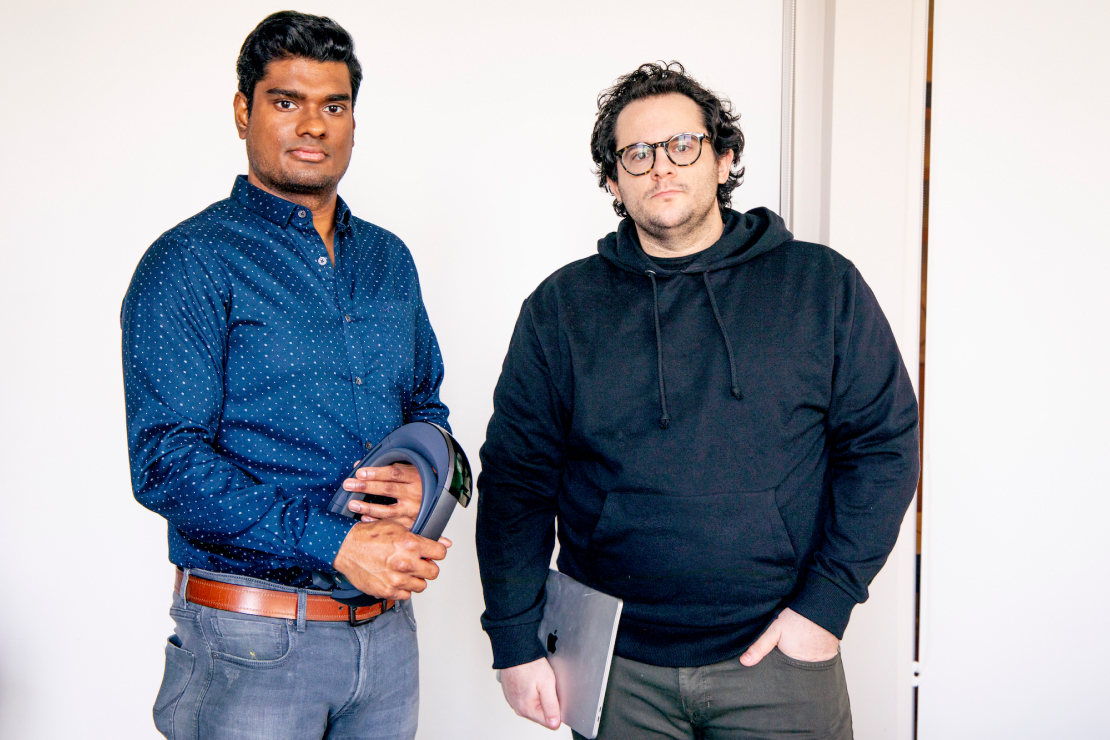Vermeer: Mixed Reality to Previsualize Drone Missions
Jul 20, 2021

Suresh Kumar, Flight Operations Director and Brian Streem, CEO
Vermeer | Air Force Accelerator Powered by Techstars 2020
Drones have quickly become an integral part of modern-day filmmaking – but getting the perfect shot is no mean feat. New York startup Vermeer uses its Augmented Reality (AR) and Virtual Reality (VR) tool to ‘fly’ in a virtual environment and design the ideal flight path before it is then carried out in the real world. Founded by Brian Streem, the startup completed the 2020 class of the Air Force Accelerator Powered by Techstars.
“You know when directors use their hands to make a box? That’s them running a simulation in their mind of what they envision the shot to be,” says Vermeer founder and CEO Brian Streem. “That ability to simulate something in the brain and then make it happen in reality has always interested me.”
Brian is a New York film school graduate who began helping film producers bring their storyboards to life in 2015. His company, Vermeer, started with drone cinematography services and worked on productions for HBO, Netflix, and Steven Spielberg.
While the original business of drone cinematography was fascinating, it was difficult, Brian says. The startup was a services firm, meaning it was hard to scale, and the very nature of film production resulted in a significant amount of back and forth to pinpoint how each client saw their world. As such, collaboration was often time consuming and sometimes required reshoots.
The answer to the perfect drone shot, Brian soon discovered, was to incorporate Augmented Reality (AR) and Virtual Reality (VR). The company developed an AR/VR application that allows film crews to ‘fly’ their desired route in a virtual environment, which Vermeer copies. Then, one of Vermeer’s operators takes a drone to the actual location and the flight plan executes autonomously to produce the exact real-world recording.
Forget using their hands to make a box: Vermeer puts producers in the pilot’s seat to direct drone camera movements as they please.
Watch this video demo to see how Vermeer works — and compare the Vermeer "previs" with the actual drone footage.
An ‘Eye-Opening’ Techstars Accelerator
A turning point for the startup and its software came at a chance meeting with Warren Katz. In 2019, Brian found himself in Buffalo, N.Y., sitting next to Warren, Managing Director of the Air Force Accelerator Powered by Techstars, who was immediately impressed by Vermeer. He suggested the startup apply for the accelerator despite submissions closing “in the next two hours”. Vermeer was accepted and immediately relocated to Boston.
The program focuses on the next generation of technologies for any and all uses of interest to the U.S. Air Force. The experience was transformative, Brian says, as the startup could now show its abilities to industries other than film.
“When I showed people in the DoD the tech, I could see it really resonating, as they saw it solving a lot of their problems,” he says. “It was really eye-opening, to be honest with you. It opened up a new world for us with the Department of Defence. Literally, within two or three months of efforts, we won several millions of dollars of DoD contracts.”
Working With Space Force
Funded by the U.S. Federal Government, SBIR, also known as the Small Business Innovation Research program, is one of the largest sources of early-stage capital in the United States, and is intended to help small businesses accelerate their dual-use products to market with non-dilutive prototyping contracts.
Vermeer is now working through two SBIR contracts following the accelerator. The first is to develop solutions intended for intelligence, surveillance, and reconnaissance missions. The second is to develop a better way to visualize and understand the 3D dynamics of satellites in space. With the growing number of satellites and space debris in orbit around the Earth, Brian says, the ability to maneuver satellites effectively is highly sought after.
“I have long suspected that what we were doing was applicable to other vehicles, like potentially navigating satellites. That was just me theorizing, but then winning two one-million-dollar contracts with the Space Force makes it not just real to me, but real to a lot of people,” he says. “And now we have an AR/VR toolkit to play with satellites in space. I’m not going to lie, it’s very cool.”
To date, Vermeer has raised $1.1M in funding, and following the completion of the contracts aims to fully commercialize the product with the Department of Defense before pursuing other applications.

